Preparing for Dissertation: Obesity and Breast Cancer Research Review
VerifiedAdded on 2021/04/21
|6
|1412
|27
Report
AI Summary
This report presents a literature review examining the relationship between obesity and breast cancer, drawing on five key articles. The review explores the impact of overweight and obesity on breast cancer etiology, tumor characteristics, and patient outcomes. It highlights the correlation between hi...
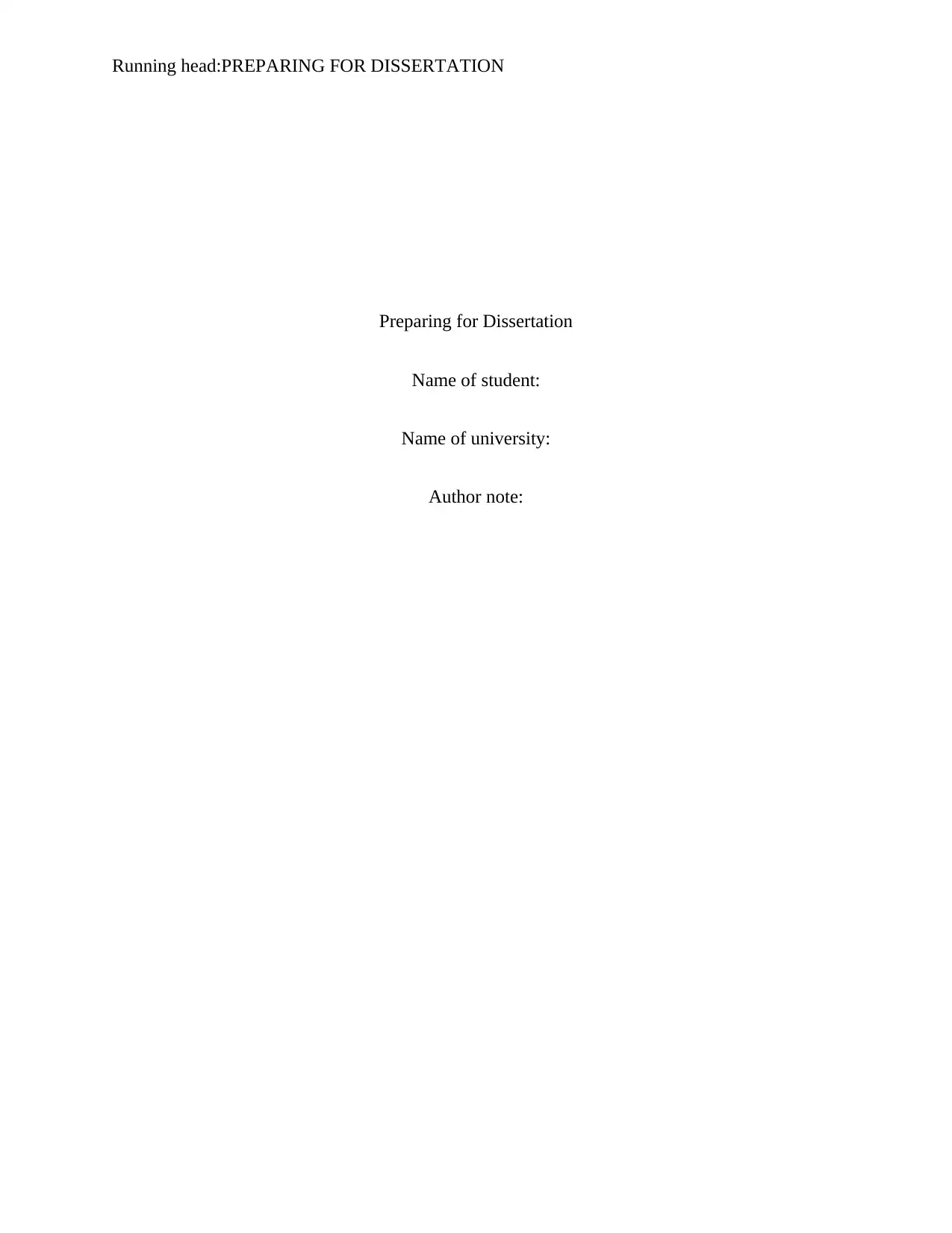
Running head:PREPARING FOR DISSERTATION
Preparing for Dissertation
Name of student:
Name of university:
Author note:
Preparing for Dissertation
Name of student:
Name of university:
Author note:
Paraphrase This Document
Need a fresh take? Get an instant paraphrase of this document with our AI Paraphraser
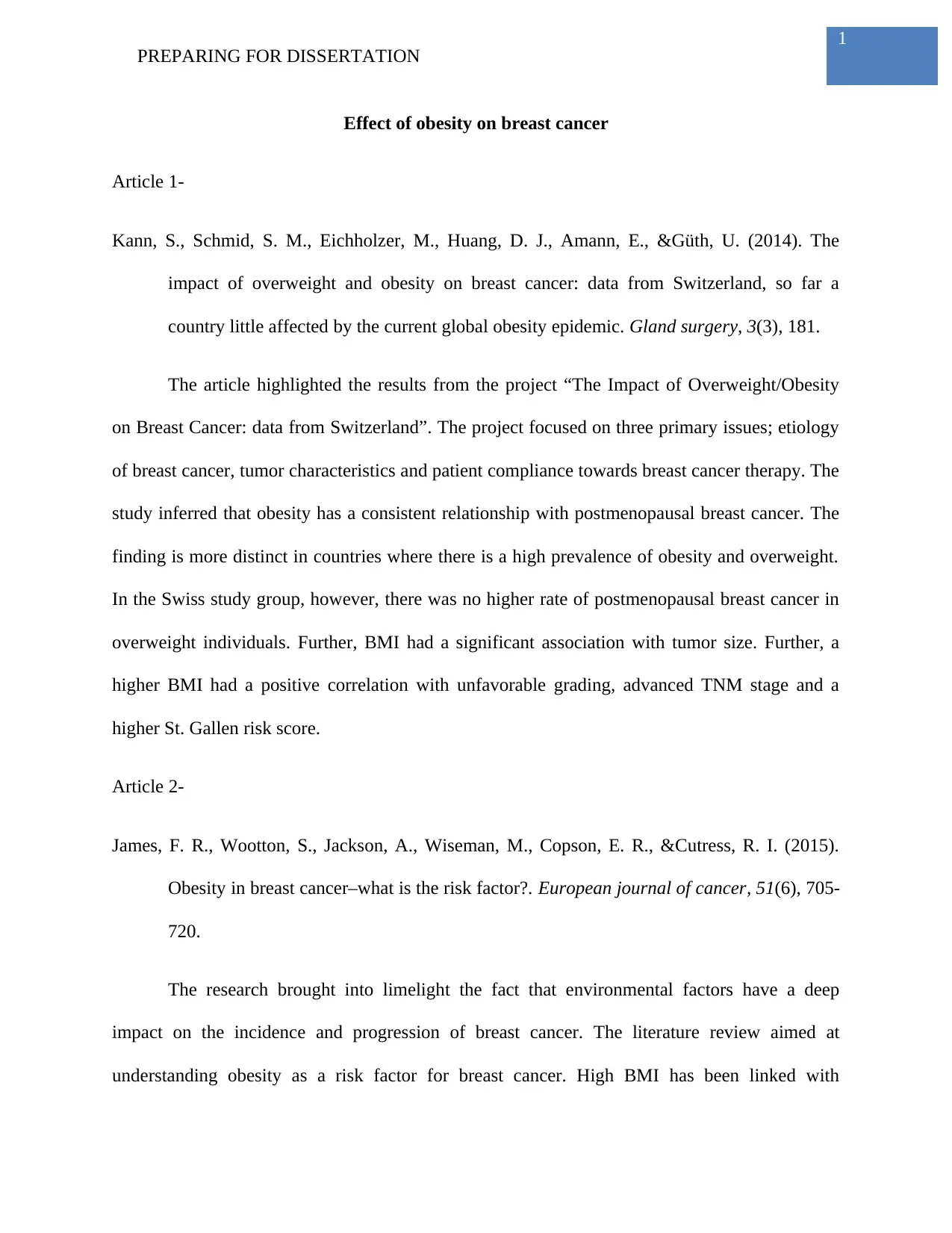
1
PREPARING FOR DISSERTATION
Effect of obesity on breast cancer
Article 1-
Kann, S., Schmid, S. M., Eichholzer, M., Huang, D. J., Amann, E., &Güth, U. (2014). The
impact of overweight and obesity on breast cancer: data from Switzerland, so far a
country little affected by the current global obesity epidemic. Gland surgery, 3(3), 181.
The article highlighted the results from the project “The Impact of Overweight/Obesity
on Breast Cancer: data from Switzerland”. The project focused on three primary issues; etiology
of breast cancer, tumor characteristics and patient compliance towards breast cancer therapy. The
study inferred that obesity has a consistent relationship with postmenopausal breast cancer. The
finding is more distinct in countries where there is a high prevalence of obesity and overweight.
In the Swiss study group, however, there was no higher rate of postmenopausal breast cancer in
overweight individuals. Further, BMI had a significant association with tumor size. Further, a
higher BMI had a positive correlation with unfavorable grading, advanced TNM stage and a
higher St. Gallen risk score.
Article 2-
James, F. R., Wootton, S., Jackson, A., Wiseman, M., Copson, E. R., &Cutress, R. I. (2015).
Obesity in breast cancer–what is the risk factor?. European journal of cancer, 51(6), 705-
720.
The research brought into limelight the fact that environmental factors have a deep
impact on the incidence and progression of breast cancer. The literature review aimed at
understanding obesity as a risk factor for breast cancer. High BMI has been linked with
PREPARING FOR DISSERTATION
Effect of obesity on breast cancer
Article 1-
Kann, S., Schmid, S. M., Eichholzer, M., Huang, D. J., Amann, E., &Güth, U. (2014). The
impact of overweight and obesity on breast cancer: data from Switzerland, so far a
country little affected by the current global obesity epidemic. Gland surgery, 3(3), 181.
The article highlighted the results from the project “The Impact of Overweight/Obesity
on Breast Cancer: data from Switzerland”. The project focused on three primary issues; etiology
of breast cancer, tumor characteristics and patient compliance towards breast cancer therapy. The
study inferred that obesity has a consistent relationship with postmenopausal breast cancer. The
finding is more distinct in countries where there is a high prevalence of obesity and overweight.
In the Swiss study group, however, there was no higher rate of postmenopausal breast cancer in
overweight individuals. Further, BMI had a significant association with tumor size. Further, a
higher BMI had a positive correlation with unfavorable grading, advanced TNM stage and a
higher St. Gallen risk score.
Article 2-
James, F. R., Wootton, S., Jackson, A., Wiseman, M., Copson, E. R., &Cutress, R. I. (2015).
Obesity in breast cancer–what is the risk factor?. European journal of cancer, 51(6), 705-
720.
The research brought into limelight the fact that environmental factors have a deep
impact on the incidence and progression of breast cancer. The literature review aimed at
understanding obesity as a risk factor for breast cancer. High BMI has been linked with
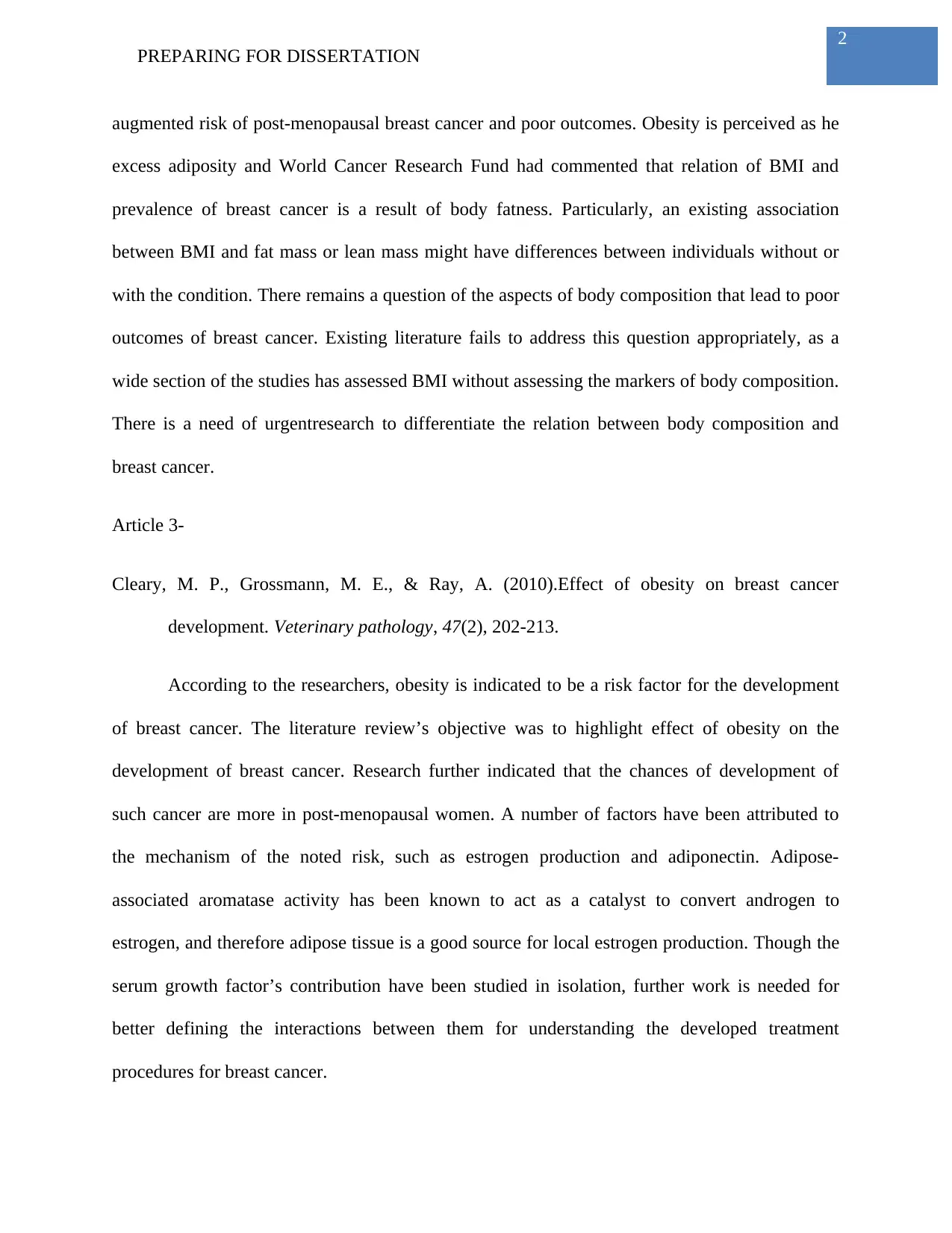
2
PREPARING FOR DISSERTATION
augmented risk of post-menopausal breast cancer and poor outcomes. Obesity is perceived as he
excess adiposity and World Cancer Research Fund had commented that relation of BMI and
prevalence of breast cancer is a result of body fatness. Particularly, an existing association
between BMI and fat mass or lean mass might have differences between individuals without or
with the condition. There remains a question of the aspects of body composition that lead to poor
outcomes of breast cancer. Existing literature fails to address this question appropriately, as a
wide section of the studies has assessed BMI without assessing the markers of body composition.
There is a need of urgentresearch to differentiate the relation between body composition and
breast cancer.
Article 3-
Cleary, M. P., Grossmann, M. E., & Ray, A. (2010).Effect of obesity on breast cancer
development. Veterinary pathology, 47(2), 202-213.
According to the researchers, obesity is indicated to be a risk factor for the development
of breast cancer. The literature review’s objective was to highlight effect of obesity on the
development of breast cancer. Research further indicated that the chances of development of
such cancer are more in post-menopausal women. A number of factors have been attributed to
the mechanism of the noted risk, such as estrogen production and adiponectin. Adipose-
associated aromatase activity has been known to act as a catalyst to convert androgen to
estrogen, and therefore adipose tissue is a good source for local estrogen production. Though the
serum growth factor’s contribution have been studied in isolation, further work is needed for
better defining the interactions between them for understanding the developed treatment
procedures for breast cancer.
PREPARING FOR DISSERTATION
augmented risk of post-menopausal breast cancer and poor outcomes. Obesity is perceived as he
excess adiposity and World Cancer Research Fund had commented that relation of BMI and
prevalence of breast cancer is a result of body fatness. Particularly, an existing association
between BMI and fat mass or lean mass might have differences between individuals without or
with the condition. There remains a question of the aspects of body composition that lead to poor
outcomes of breast cancer. Existing literature fails to address this question appropriately, as a
wide section of the studies has assessed BMI without assessing the markers of body composition.
There is a need of urgentresearch to differentiate the relation between body composition and
breast cancer.
Article 3-
Cleary, M. P., Grossmann, M. E., & Ray, A. (2010).Effect of obesity on breast cancer
development. Veterinary pathology, 47(2), 202-213.
According to the researchers, obesity is indicated to be a risk factor for the development
of breast cancer. The literature review’s objective was to highlight effect of obesity on the
development of breast cancer. Research further indicated that the chances of development of
such cancer are more in post-menopausal women. A number of factors have been attributed to
the mechanism of the noted risk, such as estrogen production and adiponectin. Adipose-
associated aromatase activity has been known to act as a catalyst to convert androgen to
estrogen, and therefore adipose tissue is a good source for local estrogen production. Though the
serum growth factor’s contribution have been studied in isolation, further work is needed for
better defining the interactions between them for understanding the developed treatment
procedures for breast cancer.
⊘ This is a preview!⊘
Do you want full access?
Subscribe today to unlock all pages.

Trusted by 1+ million students worldwide
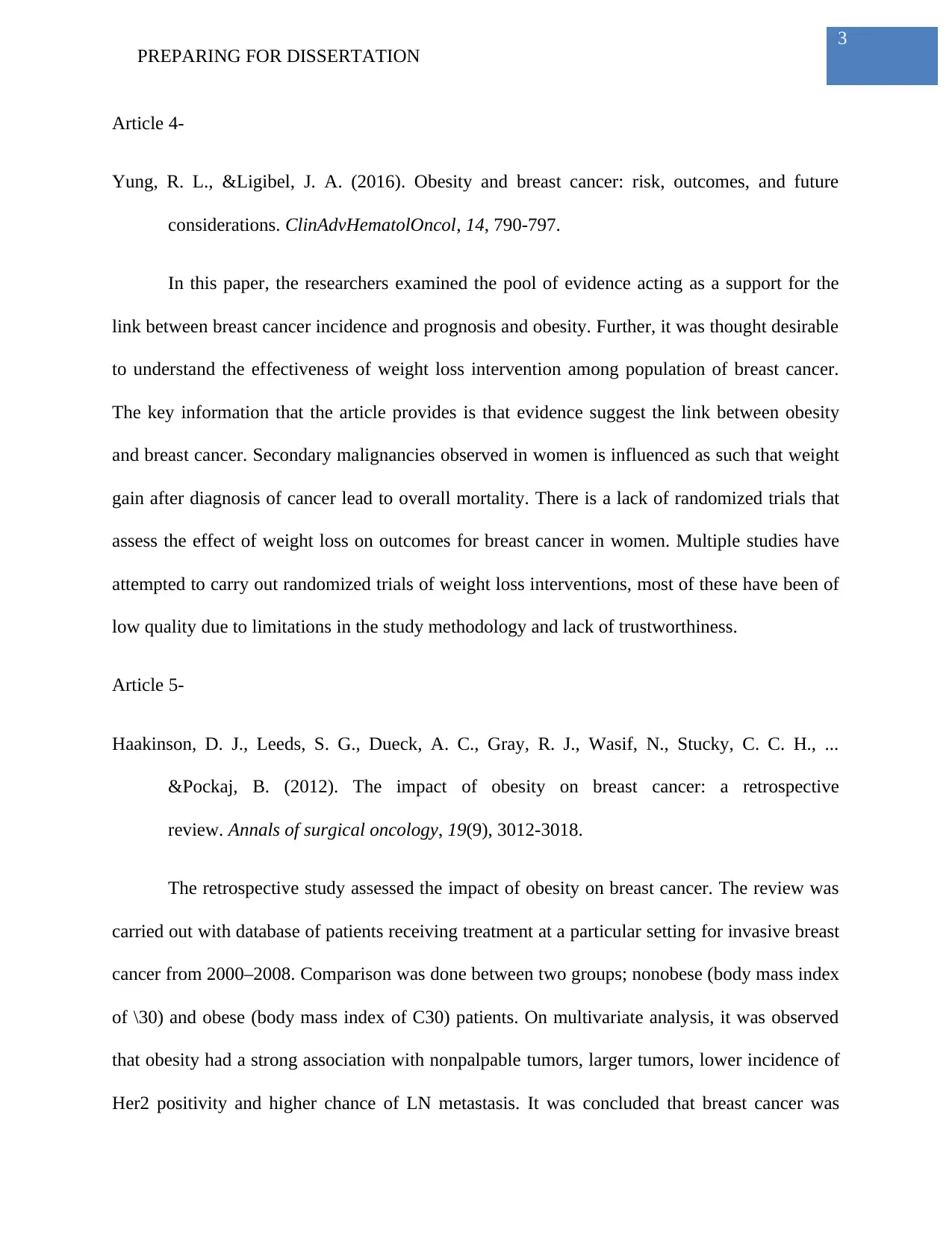
3
PREPARING FOR DISSERTATION
Article 4-
Yung, R. L., &Ligibel, J. A. (2016). Obesity and breast cancer: risk, outcomes, and future
considerations. ClinAdvHematolOncol, 14, 790-797.
In this paper, the researchers examined the pool of evidence acting as a support for the
link between breast cancer incidence and prognosis and obesity. Further, it was thought desirable
to understand the effectiveness of weight loss intervention among population of breast cancer.
The key information that the article provides is that evidence suggest the link between obesity
and breast cancer. Secondary malignancies observed in women is influenced as such that weight
gain after diagnosis of cancer lead to overall mortality. There is a lack of randomized trials that
assess the effect of weight loss on outcomes for breast cancer in women. Multiple studies have
attempted to carry out randomized trials of weight loss interventions, most of these have been of
low quality due to limitations in the study methodology and lack of trustworthiness.
Article 5-
Haakinson, D. J., Leeds, S. G., Dueck, A. C., Gray, R. J., Wasif, N., Stucky, C. C. H., ...
&Pockaj, B. (2012). The impact of obesity on breast cancer: a retrospective
review. Annals of surgical oncology, 19(9), 3012-3018.
The retrospective study assessed the impact of obesity on breast cancer. The review was
carried out with database of patients receiving treatment at a particular setting for invasive breast
cancer from 2000–2008. Comparison was done between two groups; nonobese (body mass index
of \30) and obese (body mass index of C30) patients. On multivariate analysis, it was observed
that obesity had a strong association with nonpalpable tumors, larger tumors, lower incidence of
Her2 positivity and higher chance of LN metastasis. It was concluded that breast cancer was
PREPARING FOR DISSERTATION
Article 4-
Yung, R. L., &Ligibel, J. A. (2016). Obesity and breast cancer: risk, outcomes, and future
considerations. ClinAdvHematolOncol, 14, 790-797.
In this paper, the researchers examined the pool of evidence acting as a support for the
link between breast cancer incidence and prognosis and obesity. Further, it was thought desirable
to understand the effectiveness of weight loss intervention among population of breast cancer.
The key information that the article provides is that evidence suggest the link between obesity
and breast cancer. Secondary malignancies observed in women is influenced as such that weight
gain after diagnosis of cancer lead to overall mortality. There is a lack of randomized trials that
assess the effect of weight loss on outcomes for breast cancer in women. Multiple studies have
attempted to carry out randomized trials of weight loss interventions, most of these have been of
low quality due to limitations in the study methodology and lack of trustworthiness.
Article 5-
Haakinson, D. J., Leeds, S. G., Dueck, A. C., Gray, R. J., Wasif, N., Stucky, C. C. H., ...
&Pockaj, B. (2012). The impact of obesity on breast cancer: a retrospective
review. Annals of surgical oncology, 19(9), 3012-3018.
The retrospective study assessed the impact of obesity on breast cancer. The review was
carried out with database of patients receiving treatment at a particular setting for invasive breast
cancer from 2000–2008. Comparison was done between two groups; nonobese (body mass index
of \30) and obese (body mass index of C30) patients. On multivariate analysis, it was observed
that obesity had a strong association with nonpalpable tumors, larger tumors, lower incidence of
Her2 positivity and higher chance of LN metastasis. It was concluded that breast cancer was
Paraphrase This Document
Need a fresh take? Get an instant paraphrase of this document with our AI Paraphraser
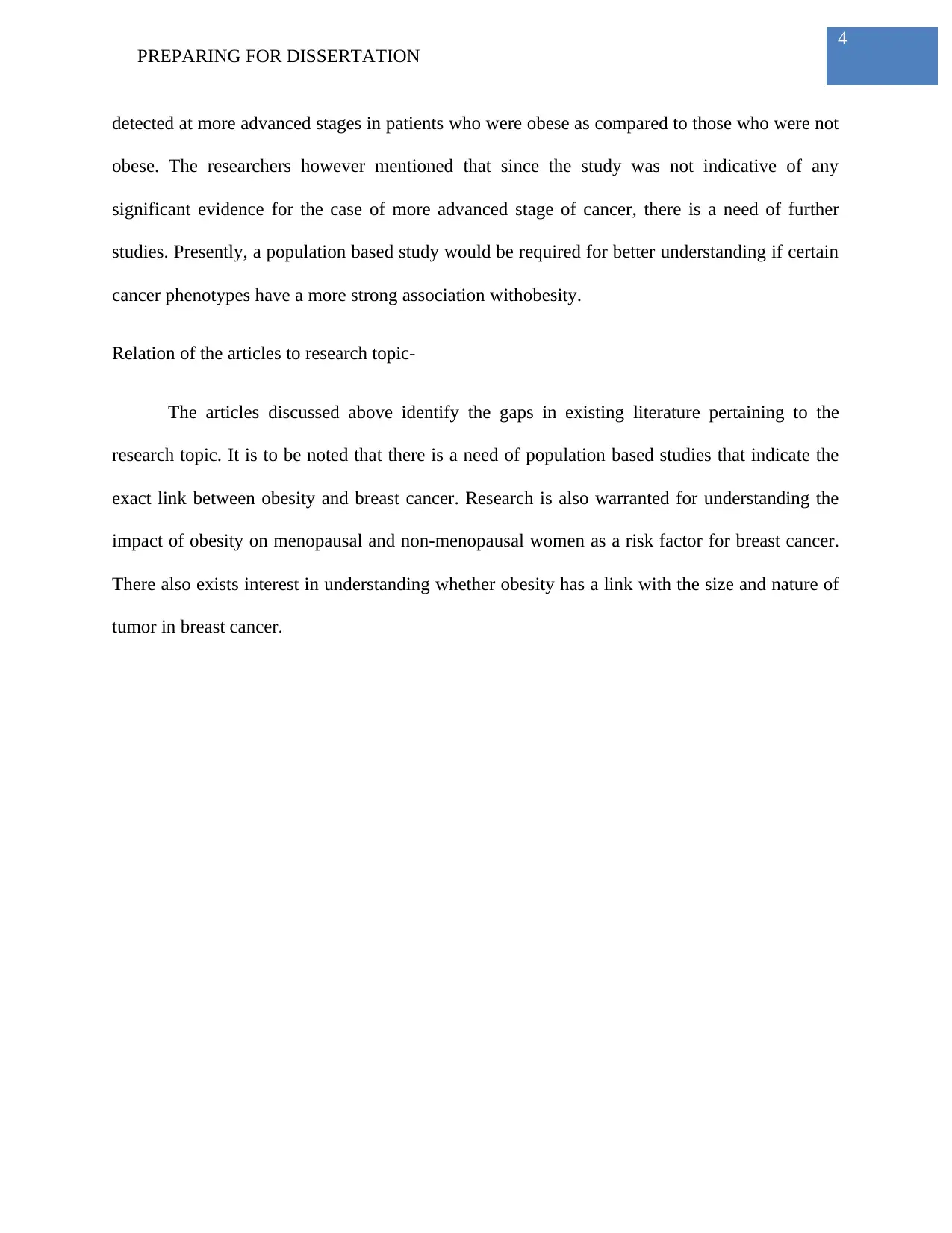
4
PREPARING FOR DISSERTATION
detected at more advanced stages in patients who were obese as compared to those who were not
obese. The researchers however mentioned that since the study was not indicative of any
significant evidence for the case of more advanced stage of cancer, there is a need of further
studies. Presently, a population based study would be required for better understanding if certain
cancer phenotypes have a more strong association withobesity.
Relation of the articles to research topic-
The articles discussed above identify the gaps in existing literature pertaining to the
research topic. It is to be noted that there is a need of population based studies that indicate the
exact link between obesity and breast cancer. Research is also warranted for understanding the
impact of obesity on menopausal and non-menopausal women as a risk factor for breast cancer.
There also exists interest in understanding whether obesity has a link with the size and nature of
tumor in breast cancer.
PREPARING FOR DISSERTATION
detected at more advanced stages in patients who were obese as compared to those who were not
obese. The researchers however mentioned that since the study was not indicative of any
significant evidence for the case of more advanced stage of cancer, there is a need of further
studies. Presently, a population based study would be required for better understanding if certain
cancer phenotypes have a more strong association withobesity.
Relation of the articles to research topic-
The articles discussed above identify the gaps in existing literature pertaining to the
research topic. It is to be noted that there is a need of population based studies that indicate the
exact link between obesity and breast cancer. Research is also warranted for understanding the
impact of obesity on menopausal and non-menopausal women as a risk factor for breast cancer.
There also exists interest in understanding whether obesity has a link with the size and nature of
tumor in breast cancer.
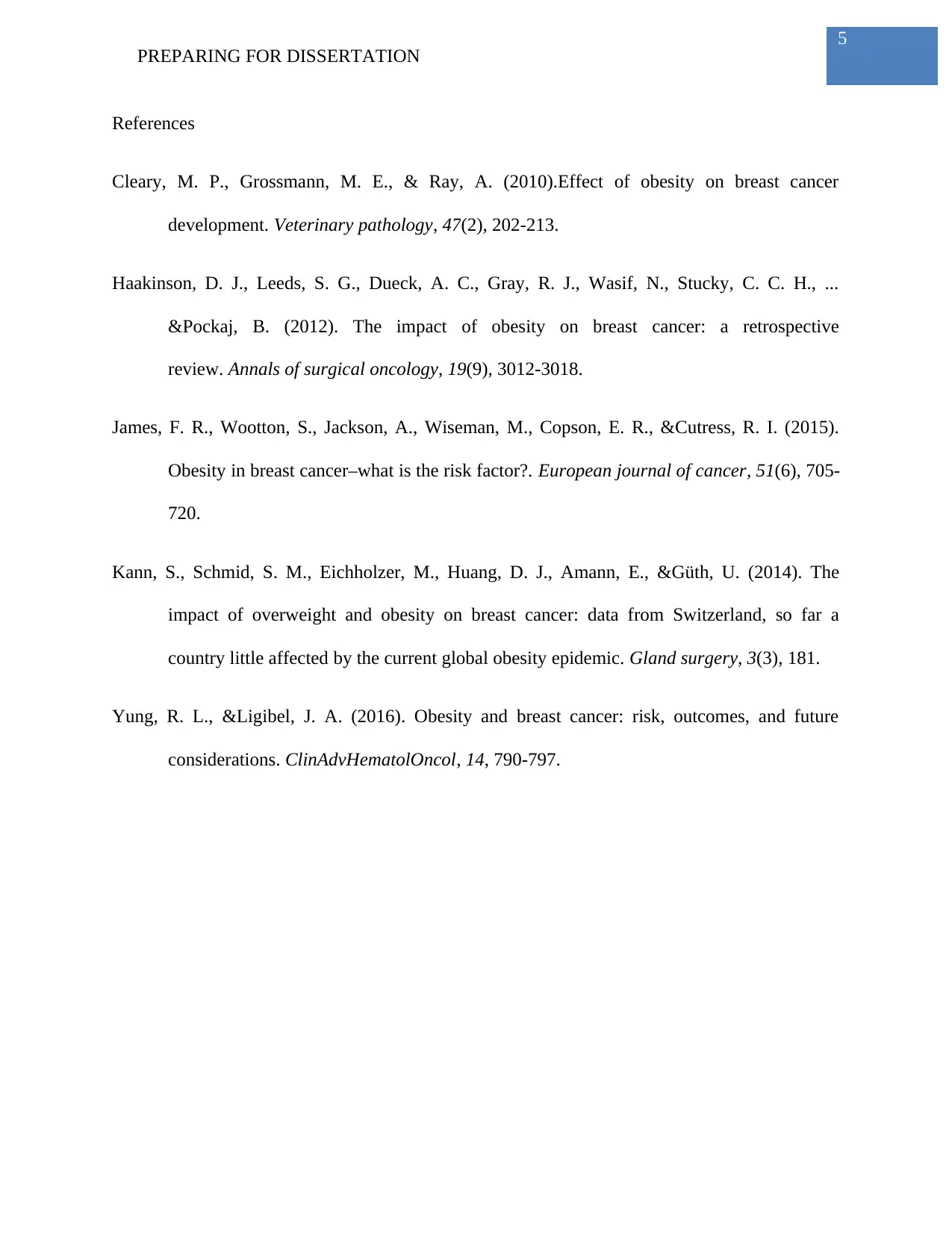
5
PREPARING FOR DISSERTATION
References
Cleary, M. P., Grossmann, M. E., & Ray, A. (2010).Effect of obesity on breast cancer
development. Veterinary pathology, 47(2), 202-213.
Haakinson, D. J., Leeds, S. G., Dueck, A. C., Gray, R. J., Wasif, N., Stucky, C. C. H., ...
&Pockaj, B. (2012). The impact of obesity on breast cancer: a retrospective
review. Annals of surgical oncology, 19(9), 3012-3018.
James, F. R., Wootton, S., Jackson, A., Wiseman, M., Copson, E. R., &Cutress, R. I. (2015).
Obesity in breast cancer–what is the risk factor?. European journal of cancer, 51(6), 705-
720.
Kann, S., Schmid, S. M., Eichholzer, M., Huang, D. J., Amann, E., &Güth, U. (2014). The
impact of overweight and obesity on breast cancer: data from Switzerland, so far a
country little affected by the current global obesity epidemic. Gland surgery, 3(3), 181.
Yung, R. L., &Ligibel, J. A. (2016). Obesity and breast cancer: risk, outcomes, and future
considerations. ClinAdvHematolOncol, 14, 790-797.
PREPARING FOR DISSERTATION
References
Cleary, M. P., Grossmann, M. E., & Ray, A. (2010).Effect of obesity on breast cancer
development. Veterinary pathology, 47(2), 202-213.
Haakinson, D. J., Leeds, S. G., Dueck, A. C., Gray, R. J., Wasif, N., Stucky, C. C. H., ...
&Pockaj, B. (2012). The impact of obesity on breast cancer: a retrospective
review. Annals of surgical oncology, 19(9), 3012-3018.
James, F. R., Wootton, S., Jackson, A., Wiseman, M., Copson, E. R., &Cutress, R. I. (2015).
Obesity in breast cancer–what is the risk factor?. European journal of cancer, 51(6), 705-
720.
Kann, S., Schmid, S. M., Eichholzer, M., Huang, D. J., Amann, E., &Güth, U. (2014). The
impact of overweight and obesity on breast cancer: data from Switzerland, so far a
country little affected by the current global obesity epidemic. Gland surgery, 3(3), 181.
Yung, R. L., &Ligibel, J. A. (2016). Obesity and breast cancer: risk, outcomes, and future
considerations. ClinAdvHematolOncol, 14, 790-797.
⊘ This is a preview!⊘
Do you want full access?
Subscribe today to unlock all pages.

Trusted by 1+ million students worldwide
1 out of 6
Related Documents
Your All-in-One AI-Powered Toolkit for Academic Success.
+13062052269
info@desklib.com
Available 24*7 on WhatsApp / Email
![[object Object]](/_next/static/media/star-bottom.7253800d.svg)
Unlock your academic potential
© 2024 | Zucol Services PVT LTD | All rights reserved.





